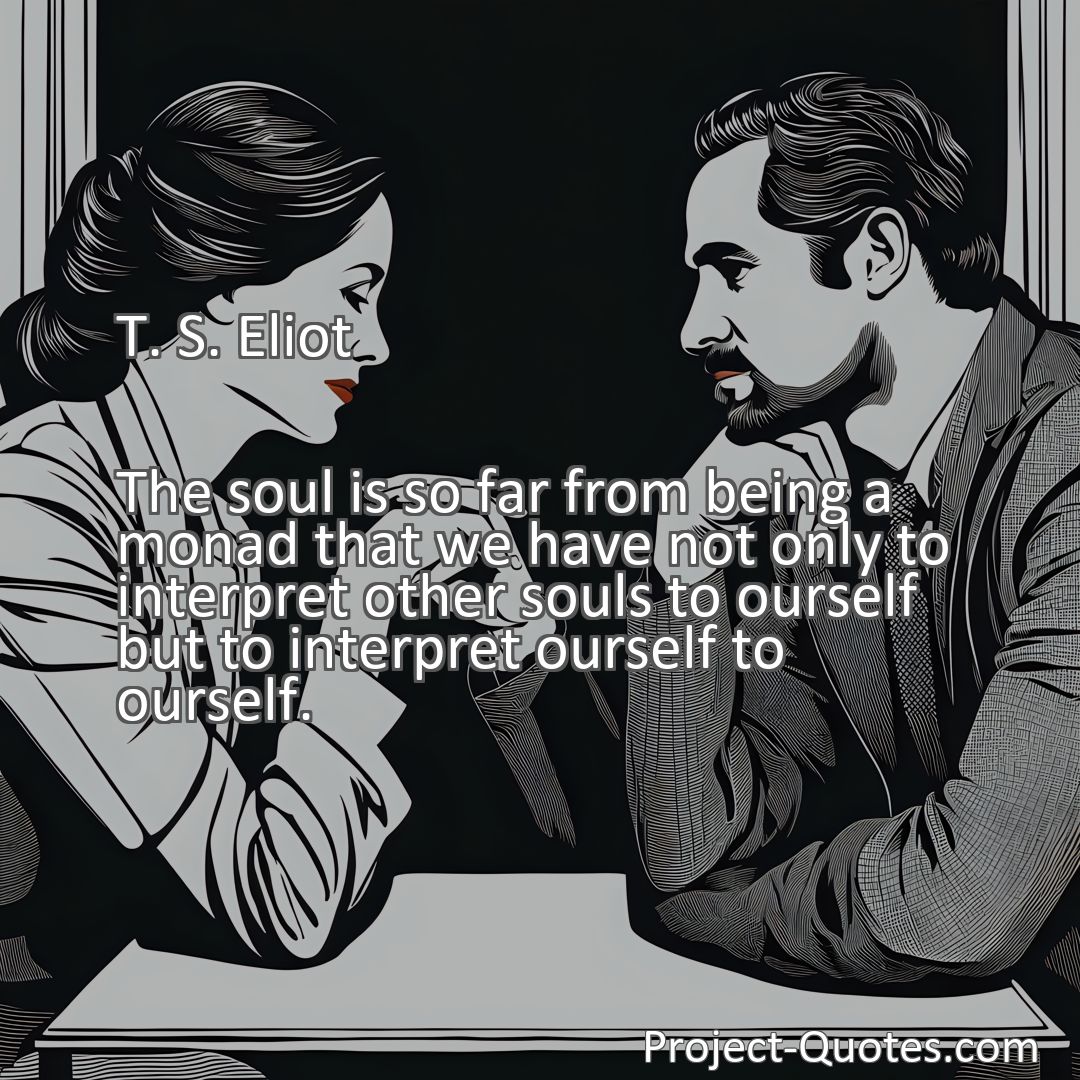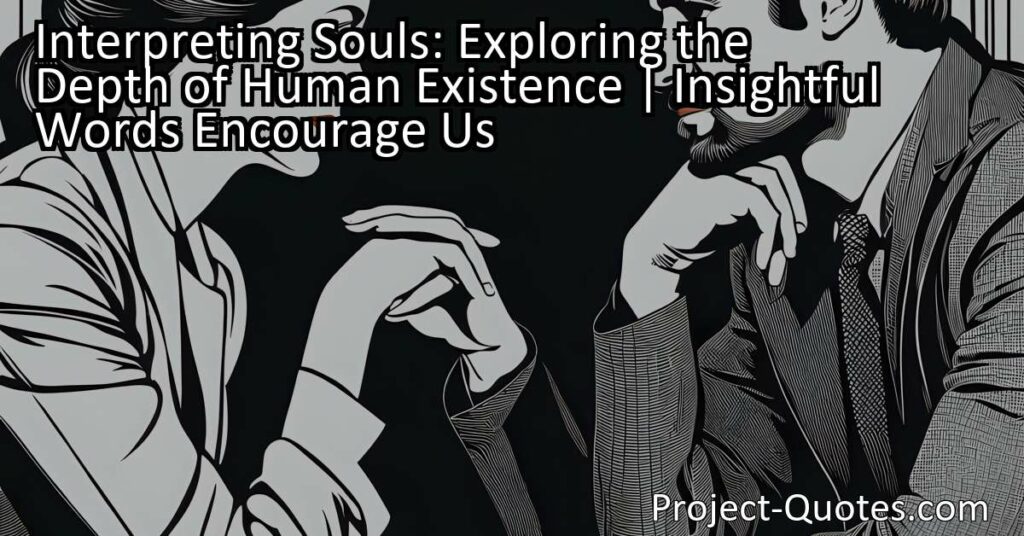The soul is so far from being a monad that we have not only to interpret other souls to ourself but to interpret ourself to ourself.
T. S. Eliot
Interpreting Souls: Exploring the Depth of Human Existence | Insightful Words Encourage Us T.S. Eliot’s insightful words challenge us to explore the depths of the human soul, both in understanding others and unraveling our own complexities. Interpreting the souls of others requires empathy and understanding, while interpreting ourselves leads to self-discovery and self-acceptance. Through these acts of interpretation, we can cultivate empathy, meaningful relationships, and nurture our authentic selves in the journey of understanding the intricacies of the human soul.
Table of Contents
- 1 The soul is so far from being a monad that we have not only to interpret other souls to ourself but to interpret ourself to ourself.
- 2 T. S. Eliot
- 3 Meaning of Quote – The soul is so far from being a monad that we have not only to interpret other souls to ourself but to interpret ourself to ourself.
- 4 Freely Shareable Quote Image
- 5 Related
Meaning of Quote – The soul is so far from being a monad that we have not only to interpret other souls to ourself but to interpret ourself to ourself.
In his thought-provoking quote, T. S. Eliot challenges us to ponder the nature of the human soul. His insightful words encourage us to delve into the depths of not only understanding the souls of others but also unraveling the complexities within our own being. Eliot suggests that the soul is far from being a solitary entity, but rather, it requires interpretation, both externally and internally.
The notion of interpreting the souls of others is an intriguing concept. It implies that there is a need for empathy and understanding in our interactions with fellow human beings. Just as we may struggle to fully grasp the intricacies of our own souls, it becomes necessary to embark on a journey of interpretation when it comes to understanding the souls of others.
When we attempt to interpret the souls of others, we are essentially striving to comprehend their deepest thoughts, emotions, and desires. This act of interpretation demands a certain level of sensitivity and open-mindedness. It requires us to step outside of our own perspective and enter into the world of another person’s experiences, beliefs, and values.
Interpreting the souls of others is a process that requires active listening and empathy. By giving our undivided attention to others, we can uncover the layers of their souls that may have remained hidden. It is through genuine connection and compassionate understanding that we can develop meaningful relationships and foster a sense of collective harmony.
However, Eliot extends his idea of interpretation one step further by emphasizing the need to interpret ourselves to ourselves. What does this mean? It suggests that we must turn inward and explore the depths of our own souls. We must engage in a process of self-reflection and self-analysis in order to gain a deeper understanding of who we truly are.
In a world that constantly bombards us with external influences and societal expectations, it is easy to lose sight of our own individuality. Society often dictates how we should think, feel, and behave, but without introspection and self-interpretation, we risk living a life that is not true to our own authentic selves.
Interpreting ourselves to ourselves implies a journey of self-discovery and self-acceptance. It means peering into the depths of our own being and uncovering the hidden layers of our souls. This introspective process allows us to understand our strengths, weaknesses, fears, and aspirations more intimately.
By interpreting ourselves to ourselves, we can align our thoughts, actions, and beliefs with our core values. It enables us to lead a more authentic and fulfilling life where we can confidently express our unique selves without fear of judgment or conformity.
However, interpreting ourselves to ourselves can also be a challenging endeavor. It requires us to confront our own vulnerabilities, insecurities, and past experiences. It demands self-compassion and a willingness to embrace our flaws and imperfections.
Yet, as we embark on this journey of self-interpretation, we begin to uncover our own hidden truths. We discover our passions, our purpose, and our own personal narrative. Through self-reflection and introspection, we gain a newfound clarity that guides our actions and shapes our identity.
Moreover, interpreting ourselves to ourselves is an ongoing process. It is not a one-time endeavor but rather a continuous exploration. Our souls are dynamic and ever-evolving, influenced by the experiences we encounter and the people we interact with.
As we grow and develop throughout our lives, our self-interpretation adjusts accordingly. We gain new insights, shed old beliefs, and refine our understanding of who we are. This constant process of interpretation not only strengthens our sense of self but also allows us to navigate the world with a deeper understanding and appreciation for our own unique existence.
In conclusion, T. S. Eliot’s quote embodies the profound idea that our souls are far from being isolated monads. We are called upon to interpret the souls of others, striving for understanding and connection. Simultaneously, we must also interpret ourselves to ourselves, embarking on a journey of self-discovery and self-acceptance. Through these acts of interpretation, we can cultivate empathy, foster meaningful relationships, and nurture our own authentic selves. So, let us embrace the challenge of interpretation, both in interpreting the souls of others and in unraveling the complexities within our own being, as we navigate the intricacies of the human soul.
I hope this quote inspired image brings you hope and peace. Share it with someone who needs it today!


